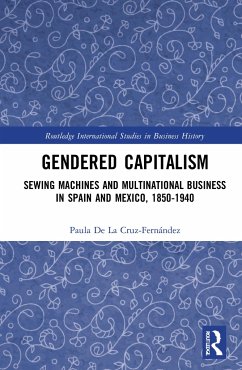Gendered Capitalism: Sewing Machines and Multinational Business in Spain and Mexico, 1850-1940 is a history of the gendered corporation, a study that examines how ideas and ideals about domesticity and the cultures of sewing and embroidery, being gender-specific, shaped the US-headquartered Singer Sewing Machine Company's operations around the world. In contrast to production-driven and culture-neutral analyses of the multinational enterprise, this book focuses on both the supply and the demand side to argue that consumers and the cultural worlds of those-mainly women-using the sewing machine for personal purposes or for the market shaped corporate organization.
This book is a global history of Singer, but it also focuses on the cases of Spain and Mexico to highlight nations where the sewing machine multinational never established manufacturing operations. Casa Singer was a mostly profitable and a long-term selling and marketing operation in both countries. Gendered Capitalism demonstrates that local Spanish and Mexican agents, both men and women, developed and expanded Singer's selling system to the extent that the multinational company was seen as domestic, both in the location sense, and because of its focus on the private sphere of the home. By bringing the cases of Spain and Mexico, and the cultural, everyday realm of practices related to sewing and embroidery that the sewing machine was part of, to the center of the study of international business, Gendered Capitalism further reveals the layers of complexities and multitudes that conform the history of global capitalism.
This book will be of interest to readers and scholars in the fields of business history, economic cultural history, management studies, international business, women's history, gender studies, and the history of technology.
This book is a global history of Singer, but it also focuses on the cases of Spain and Mexico to highlight nations where the sewing machine multinational never established manufacturing operations. Casa Singer was a mostly profitable and a long-term selling and marketing operation in both countries. Gendered Capitalism demonstrates that local Spanish and Mexican agents, both men and women, developed and expanded Singer's selling system to the extent that the multinational company was seen as domestic, both in the location sense, and because of its focus on the private sphere of the home. By bringing the cases of Spain and Mexico, and the cultural, everyday realm of practices related to sewing and embroidery that the sewing machine was part of, to the center of the study of international business, Gendered Capitalism further reveals the layers of complexities and multitudes that conform the history of global capitalism.
This book will be of interest to readers and scholars in the fields of business history, economic cultural history, management studies, international business, women's history, gender studies, and the history of technology.








